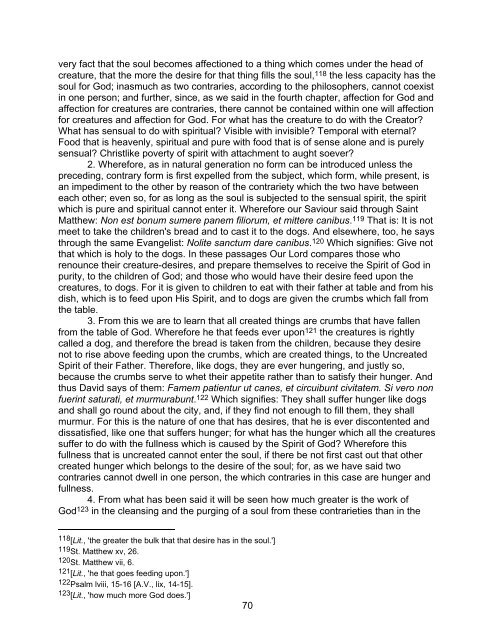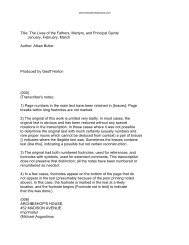Ascent of Mt. Carmel - St. Patrick's Basilica
Ascent of Mt. Carmel - St. Patrick's Basilica
Ascent of Mt. Carmel - St. Patrick's Basilica
You also want an ePaper? Increase the reach of your titles
YUMPU automatically turns print PDFs into web optimized ePapers that Google loves.
very fact that the soul becomes affectioned to a thing which comes under the head <strong>of</strong><br />
creature, that the more the desire for that thing fills the soul, 118 the less capacity has the<br />
soul for God; inasmuch as two contraries, according to the philosophers, cannot coexist<br />
in one person; and further, since, as we said in the fourth chapter, affection for God and<br />
affection for creatures are contraries, there cannot be contained within one will affection<br />
for creatures and affection for God. For what has the creature to do with the Creator?<br />
What has sensual to do with spiritual? Visible with invisible? Temporal with eternal?<br />
Food that is heavenly, spiritual and pure with food that is <strong>of</strong> sense alone and is purely<br />
sensual? Christlike poverty <strong>of</strong> spirit with attachment to aught soever?<br />
2. Wherefore, as in natural generation no form can be introduced unless the<br />
preceding, contrary form is first expelled from the subject, which form, while present, is<br />
an impediment to the other by reason <strong>of</strong> the contrariety which the two have between<br />
each other; even so, for as long as the soul is subjected to the sensual spirit, the spirit<br />
which is pure and spiritual cannot enter it. Wherefore our Saviour said through Saint<br />
Matthew: Non est bonum sumere panem filiorum, et mittere canibus. 119 That is: It is not<br />
meet to take the children's bread and to cast it to the dogs. And elsewhere, too, he says<br />
through the same Evangelist: Nolite sanctum dare canibus. 120 Which signifies: Give not<br />
that which is holy to the dogs. In these passages Our Lord compares those who<br />
renounce their creature-desires, and prepare themselves to receive the Spirit <strong>of</strong> God in<br />
purity, to the children <strong>of</strong> God; and those who would have their desire feed upon the<br />
creatures, to dogs. For it is given to children to eat with their father at table and from his<br />
dish, which is to feed upon His Spirit, and to dogs are given the crumbs which fall from<br />
the table.<br />
3. From this we are to learn that all created things are crumbs that have fallen<br />
from the table <strong>of</strong> God. Wherefore he that feeds ever upon 121 the creatures is rightly<br />
called a dog, and therefore the bread is taken from the children, because they desire<br />
not to rise above feeding upon the crumbs, which are created things, to the Uncreated<br />
Spirit <strong>of</strong> their Father. Therefore, like dogs, they are ever hungering, and justly so,<br />
because the crumbs serve to whet their appetite rather than to satisfy their hunger. And<br />
thus David says <strong>of</strong> them: Famem patientur ut canes, et circuibunt civitatem. Si vero non<br />
fuerint saturati, et murmurabunt. 122 Which signifies: They shall suffer hunger like dogs<br />
and shall go round about the city, and, if they find not enough to fill them, they shall<br />
murmur. For this is the nature <strong>of</strong> one that has desires, that he is ever discontented and<br />
dissatisfied, like one that suffers hunger; for what has the hunger which all the creatures<br />
suffer to do with the fullness which is caused by the Spirit <strong>of</strong> God? Wherefore this<br />
fullness that is uncreated cannot enter the soul, if there be not first cast out that other<br />
created hunger which belongs to the desire <strong>of</strong> the soul; for, as we have said two<br />
contraries cannot dwell in one person, the which contraries in this case are hunger and<br />
fullness.<br />
4. From what has been said it will be seen how much greater is the work <strong>of</strong><br />
God 123 in the cleansing and the purging <strong>of</strong> a soul from these contrarieties than in the<br />
118 [Lit., 'the greater the bulk that that desire has in the soul.']<br />
119<strong>St</strong>. Matthew xv, 26.<br />
120<strong>St</strong>. Matthew vii, 6.<br />
121 [Lit., 'he that goes feeding upon.']<br />
122Psalm lviii, 15-16 [A.V., lix, 14-15].<br />
123 [Lit., 'how much more God does.']<br />
70






